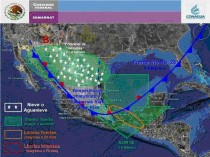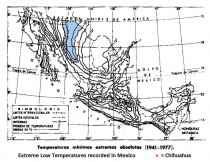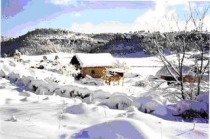By Clive James, Standpoint

It never rains: Brisbane, January 2011
Poetry, said Auden, makes nothing happen. Usually it doesn’t, but sometimes a poem gets quoted in a national argument because everybody knows it, or at least part of it, and for the occasion a few lines of familiar poetry suddenly seem the best way of summing up a viewpoint. Just such an occasion has occurred recently in Australia. By the time the heavy rains first hit Queensland early this year, the theory of Catastrophic Anthropogenic Global Warming (CAGW, to borrow the unlovely acronym) was ceasing to exercise unquestioned thrall in the minds of Australia’s progressive voters. But spokespersons for the Green party clung on to it, encouraged by the fact that the theory, in its Climate Change form, was readily applicable to any circumstances.
Before the floods, proponents of the CAGW view had argued that there would never be enough rain again, because of Climate Change. When it became clear that there might be more than enough rain, the view was adapted: the floods, too, were the result of Climate Change. In other words, they were something unprecedented. Those opposing this view - those who believed that in Australia nothing could be less unprecedented than a flood unless it was a drought - took to quoting Dorothea Mackellar’s poem “My Country”, which until recently every Australian youngster was obliged to hear recited in school. In my day we sometimes had to recite it ourselves, and weren’t allowed to go home until we had given evidence that we could remember at least the first four lines of the second stanza, which runs like this.
I love a sunburnt country,
A land of sweeping plains,
Of ragged mountain ranges,
Of droughts and flooding rains.
I love her far horizons,
I love her jewel-sea,
Her beauty and her terror -
The wide brown land for me.
The first four lines of the stanza are the bit that everybody knows, partly because they are so addictively crafted, and partly because they fit the national experience of what Australia’s geography and climate are actually like. In any household, the seniors (known in Australia as “the wrinklies") remember the droughts and the flooding rains of their childhood. I myself remember the Maitland floods of the early 1950s. The whole of the central seaboard of New South Wales was under water. I can remember rain you couldn’t see through: right there in my southern suburb of Sydney, the creek flooded the park, and the lake in the park spilled into the bottom of our street, prompting the construction of a galvanised iron canoe in which three of us sailed to what would have been certain death if the contraption had floated for more than a few seconds.
All three of us are old men now, of differing achievements and views, but none of us would be easily persuaded that the recent floods were a new thing. They come and go in long cycles, spaced apart by droughts.
See much more of this wonderful essay by an intellectual in Australia who sees through the AGW scam perpetrated by opportunist scientists and politicians.
By Joseph D’Aleo, CCM, AMS Fellow, First Director of Meteorology at The Weather Channel
Carl Parker, On Camera Meteorologist at the once watchable Weather Channel blogged a response dated March 3 to skeptic criticism of a recent post in which he tries to explain that virtually all scientists agree with him and the network on global warming quotes a survey to support that claim. I guess the ghost of Heidi Cullen continues to haunt the halls. We had hoped with her departure, sanity or at least some balance would return.
In his post a defensive Parker writes:
Consensus
Now, a couple of you objected to my use of the word consensus, so I looked it up and found this:
a : general agreement
b : the judgment arrived at by most of those concerned
It is I think by any reasonable standard fair to say that if 90% of more than 3100 earth scientists agree on something, that fits the definition of consensus.
....Man’s Culpability
As to the question of what most scientists are saying about man’s culpability, we can return to the University of Illinois study and see that 82% of the respondents agreed that “human activity is a significant contributing factor in changing mean global temperatures.”
Again, this was 3146 scientists, specializing in climatology, meteorology, geochemistry, geophysics, oceanography, geology, hydrology/hydrogeology and paleontology. Of the climatologists, a staggering 97% agreed to the same question…
It’s very difficult for me to understand the disdain for science that exists today. Though we see unequivocal results in surveys, and though this consensus is backed by nearly every major scientific organization, some still see scientists as nefarious and engaged in conspiracy.
Recall, ICECAP, SPPI and Lawrence Solomon posted on this survey. The facts are very different than Parker claims.
The 97% number stems from a 2009 online survey of 10,257 earth scientists, conducted by two researchers at the University of Illinois. The survey results must have deeply disappointed the researchers - in the end, they chose to highlight the views of a subgroup of just 77 scientists, 75 of whom thought humans contributed to climate change. The ratio 75/77 produces the 97% figure that pundits now tout.
The two researchers started by altogether excluding from their survey the thousands of scientists most likely to think that the Sun, or planetary movements, might have something to do with climate on Earth - out were the solar scientists, space scientists, cosmologists, physicists, meteorologists and astronomers. That left the 10,257 scientists in disciplines like geology, oceanography, paleontology, and geochemistry that were somehow deemed more worthy of being included in the consensus. The two researchers also decided that scientific accomplishment should not be a factor in who could answer - those surveyed were determined by their place of employment (an academic or a governmental institution). Neither was academic qualification a factor - about 1,000 of those surveyed did not have a PhD, some didn’t even have a master’s diploma.
To encourage a high participation among these remaining disciplines, the two researchers decided on a quickie survey that would take less than two minutes to complete, and would be done online, saving the respondents the hassle of mailing a reply. Nevertheless, most didn’t consider the quickie survey worthy of response - just 3146, or 30.7%, answered the two questions on the survey:
1. When compared with pre-1800s levels, do you think that mean global temperatures have generally risen, fallen, or remained relatively constant?
2. Do you think human activity is a significant contributing factor in changing mean global temperatures?
The questions were actually non-questions. From my discussions with literally hundreds of skeptical scientists over the past few years, I know of none who claims that the planet hasn’t warmed since the 1700s, and almost none who think that humans haven’t contributed in some way to the recent warming -quite apart from carbon dioxide emissions, few would doubt that the creation of cities and the clearing of forests for agricultural lands have affected the climate. When pressed for a figure, global warming skeptics might say that human are responsible for 10% or 15% of the warming; some skeptics place the upper bound of man’s contribution at 35%. The skeptics only deny that humans played a dominant role in Earth’s warming.
Surprisingly, just 90% of those who responded to the first question believed that temperatures had risen - I would have expected a figure closer to 100%, since Earth was in the Little Ice Age in the centuries immediately preceding 1800. But perhaps some of the responders interpreted the question to include the past 1000 years, when Earth was in the Medieval Warm Period, generally thought to be warmer than today.
As for the second question, 82% of the earth scientists replied that that human activity had significantly contributed to the warming. Here the vagueness of the question comes into play. Since skeptics believe that human activity been a contributing factor, their answer would have turned on whether they consider a 10% or 15% or 35% increase to be a significant contributing factor. Some would, some wouldn’t.
In any case, the two researchers must have feared that an 82% figure would fall short of a convincing consensus - almost one in five wasn’t blaming humans for global warming - so they looked for subsets that would yield a higher percentage. They found it - almost - in those whose recent published peer-reviewed research fell primarily in the climate change field. But the percentage still fell short of the researchers’ ideal. So they made another cut, allowing only the research conducted by those earth scientists who identified themselves as climate scientists.
Once all these cuts were made, 75 out of 77 scientists of unknown qualifications were left endorsing the global warming orthodoxy. The two researchers were then satisfied with their findings. Are you?
I would have answered yes to both questions. Sure we have warmed since the Little Ice Age and man plays a role in changing climate locally through land use and urbanization. The survey was a joke. The Weather channel blog using it to support their advocacy more proof how low the old network and weather.com has fallen.
By Dr. Richard Keen
My first visit to Mexico nearly forty years ago began on an icy note. I boarded the overnight train in Juarez and headed south to warmer climes, or so I thought. The Ferrocarril was unheated, and in the morning I wrote a short entry in my diary: “a miserable ride - frost inside the windows”. As the sun rose south of Chihuahua, the scene was quite unexpected - patches of snow lying in the shade of the Joshua trees and barrel cacti. It was New Year’s Day, 1973.

(Enlarged)
After returning home a few weeks later, I looked up some records of the climate of the Chihuahuan desert, and discovered that I should not have been surprised by finding freezing temperatures and snow in northern Mexico. Chihuahua, the capital of the large Mexican state of the same name, is the coldest major city in the country - sort of the Minneapolis of Mexico. Snowfall may occur several times in a winter, and the average daily minimum temperature in January is 2C (36F). It was about 20F when I rode through on the icy train.
Listed all-time record lows for different time periods include -10C (18F) on December 10, 1978 (SMN, Servicio Meteorologico Nacional); -11C (12F) ("Climates of the World” in the U.S. Department of Agriculture Yearbook, 1930); -12C (10F) December 29 2003 (Weather Underground daily data since 1975), -15C (5F) at meteorologyclimate.com, and -16C (3F) on mherrera.org. Just a few months ago, on Nov. 30 and Dec. 1, 2010, Chihuahua chilled at -11C (14F).

(Enlarged)
At the end of January, SMN issued a weather advisory: Intensa masa artica afectara el Norte de Mexico (you don’t need to read Spanish to get the gist). Snow was predicted for the northern third of the country. The arctic air mass arrived, and when the cold wave was over a week later, several records were gone. SMN’s “Comunicado de Prensa No. 034-11” summarized the freeze:
“Cold Front Number 26 led to a sharp drop in temperatures, especially in the mountain regions of Chihuahua, where temperatures fell to -21C. Meanwhile in Ciudad Juarez minus 18C was recorded, surpassing the record of February 1956, when it reached 15C degrees below zero.” Juarez, where I boarded the train 40 years earlier, recorded an even zero Fahrenheit, a full 5F colder than the previous low in 1956. Chihuahua maintained its status as Mexico’s coldest major city with a low of -18.5C (-1F), beating all previous records by at least 4 degrees F. The -21C (-5F) was recorded at a somewhat smaller city in the hills west of Chihuahua, Temosachic. Numerous other records are listed in the SMN Comunicado.

(Enlarged)
Although the historic cold wave set cold records in many of northern Mexico’s largest cities, it did not set a record for the country as whole. The listings of extremes on www.meteorologyclimate.com and www.mherrera.org list Mexico’s coldest reading as -28.5C (-19F) at Valerio in January 1949, but flag the record as “unofficial, suspicious, taken in a sinkhole”. Runner-up record lows include Los Lamentos -28C, San Juanito -27C, and La Rosilla -26.2C (-15F). The last location is in a high valley (2750 meters, 9000 feet) in the neighboring state of Durango. La Rosilla reached -20C (-4F) on February 5, 2011 - cold, but not a local record. Apparently the coldest air was too shallow to reach the high valley. Lows around -18C (zero F) have occurred several times this winter in La Rosilla, and apparently the town has a reputation as the “Frostbite Falls” of Mexico.

La Rosilla, Durango: Mexico’s Icebox (Enlarged)
A final note:
From “The Chihuahua FAQ”, “Owners must be very sensitive to the fact that short-haired Chihuahuas, and even long-haired ones, are vulnerable to the cold. In temperatures of 35-40 degrees Fahrenheit, I would recommend dressing your Chihuahua in a special dog sweater for brief walks. Walking your Chihuahua in temperatures below 35 degrees Fahrenheit is strongly discouraged, especially when there is a wind-chill factor.”
The native habitat of these dogs has been as much as 20C colder than the dog’s rated temperature of 2C. If the unusual cold persists, should Chihuahuas be deemed endangered, thus warranting international efforts to raise the global temperature for the sake of this remarkable species?
See PDF with information sources listed.


